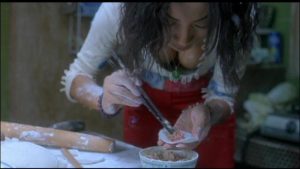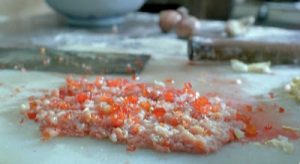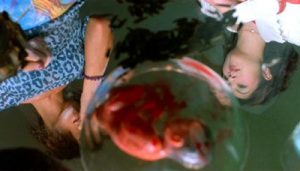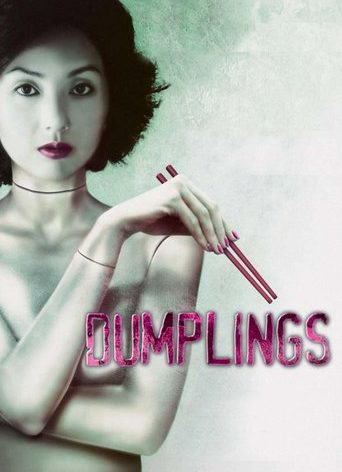Dumplings, 2004
Dumplings
Images
“I am assured by a very knowing American of my acquaintance in London; that a young healthy child, well nursed, is, at a year old, a most delicious, nourishing, and wholesome food; whether stewed, roasted, baked or boiled, and I make no doubt, that it will equally serve in a fricassee, or ragout.”- “A Modest Proposal for Preventing the Children of Poor People From Being a Burthen to Their Parents or Country, and for Making Them Beneficial to the Publick” (p. 207) – Jonathan Swift

Obsessive compulsive.
Food represents one of the most primal, vulnerable, feared, respected, carnal and irreplaceable needs of man. It makes Kings out of peasants, it is also the catalyst of the decline of many a leaders and their empires. It makes man steal, it makes him take lives. Food also drives mothers to sell their newborns. It can make an entire continent fear and detest a single man (Stalin’s Collectivism 1928-1940); food also makes victims of kidnapping plunge into a state of projection and self-preservation, resulting in the Stockholm Syndrome. In other words it can make you fall in love with your tormentor.

On the other hand when food is in surplus, like everything else it will transform into something from which, even more can be derived, more than just to satiate the hunger; more than what the body needs. The need transforms into a deviant want, with need still hanging on with all its essence intact. Now, if we take that mix and hand it over to someone who has seen it all, done it all, been everywhere, eaten everything – well almost everything – that person is bound to (or compelled to, for immediate gratification) either channel that need by giving away the extra after ensuring that the person has enough for himself (‘there’s no bigger pleasure in life than giving‘) or let the ever-gnawing id violate the whole deal and turn need in to deviant sexual play (Nine and a Half Weeks, 1986) or a ruthless, manic and highly refractory show of excess with food being the heinous excess and hunger as punishment (Salo, 1975). It is used by Swift in his 1729 publication to invent satire like no other; asking the impoverished to sell their offsprings as food and for the wealthy to buy them to create an economic balance where food is in surplus and where poverty is diminished.

An infantile urge which, not only motivates man into doing but when in surplus the brain will come up with many different ways, in which the intemperance of deviancy is terrifyingly obsessive; the undoing of the human being. Take for example Freud‘s conclusions on psycho-sexual development in babies. The anal stage has also crept into the lives of grown-ups who want to partake of all or most of the acts stimulating the erogenous zones that have been kept off-limits since childhood by The Church or The State since the beginning of man. The derivation of desires from the mouth, the rectum; the subject of deviant pleasure in general is taboo even today.

Now, take it one step further.
Dumplings is a Cantonese film by director Fruit Chan (Made in Hong Kong, 1997) whose subtle, almost dragging pace gives the incongruities time to build on their own as the main narrative continues in a parallel universe. A universe devoid of witch-doctors, the ‘today, tomorrow and forever’s special‘ and the need to reverse time, biologically. That is until both universes meet.
Once the viewer has reluctantly come to terms with the deviancy; the incompatibilities (now fully grown) blow up in the viewers’ and the actors’ faces, almost all at once, resulting in some of the most satisfying sequences and set-pieces ever.

The ravishing Mrs. Li (Miriam Chin Wah Yeung) and the, equally if not more, desirable Bai ling as Mei, “The Cook” pull us in with their vanity and the dissolution of morals upon discovery. The film pulsates with its themes of inequality, dependence of the wealthy on the filthy (watch out for the horrifying transformation) a pregnant teenager and the overall plight of the lower strata, which is bustling with just statistics and not people, who are crammed up in an ant-farm of an apartment complex. The transformation is sudden and the film balances on it for a while until it falls again into depravity of the soul. Coupled with a cheating husband and a chick fetus being consumed by the mega-rich, the film hammers a futile but obstinate purpose into our psyches. We feel for both the main characters even when they are indulging their vile and maddening fetishes.
The two women form a bond, ironically by virtue of their mental and societal polarity and what each of them can offer to the other. They are later joined and eventually become one by the end of the 91 minute a wire-coat-hanger abortion gone right running time. The choppy drugged up score puts a seal of approval on even ‘most hard to stomach’ scenes.

The film is not easy to watch. No ma’am. However, what it shows is a slight amplification of a practice to benefit from, in ways, and deconstruct at the same time, something like A Modest Proposal by Jonathan Swift.
Surreal, uneasy with top-notch performances and camera-angles to literally die of; Dumplings is yet another bizarrely coloured film from a land whose appetite for liberation is even more fierce after the 2006 independence.

Repression is a bitch and so is a half-cooked octopus.
Must watch.
BBC food fans must stay far away.

